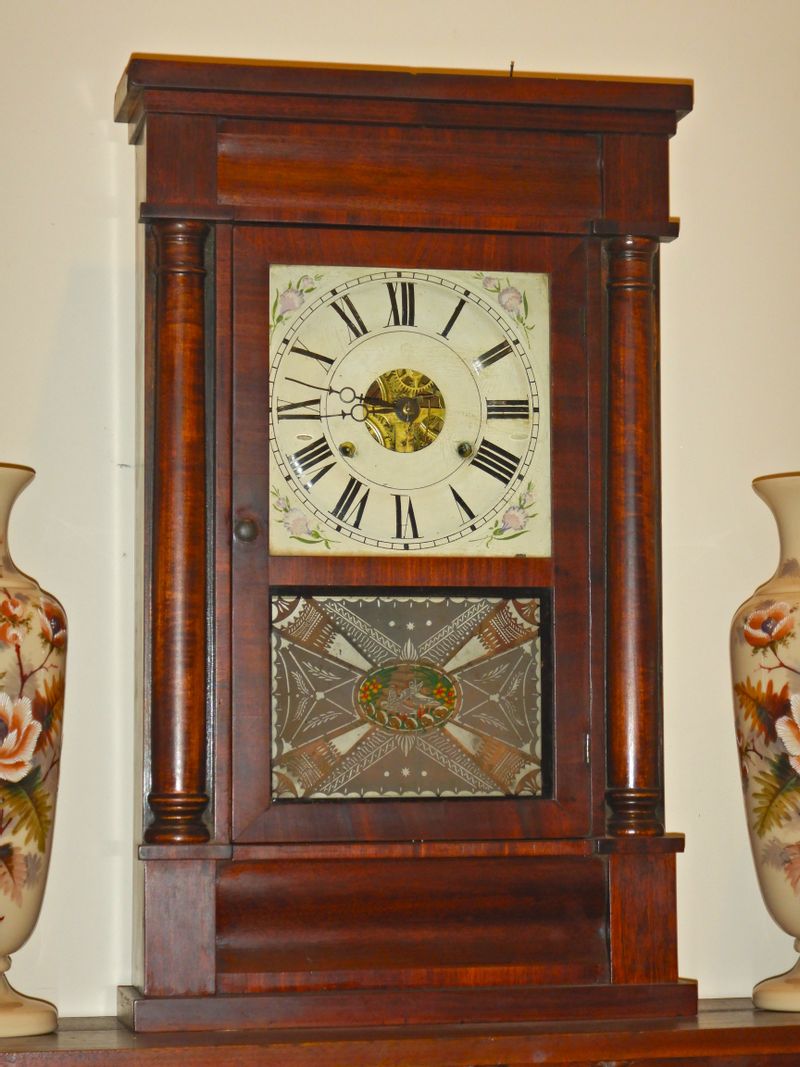Civil War Era Seth Thomas Clock
Last Updated 2/13/2024
By Jubilee P. Reid

Those who take an interest in the history of clocks in America will undoubtedly know the name of Seth Thomas (1785 – 1859), the renowned American clockmaker of Plymouth Hollow, Connecticut. Seth Thomas manufactured many types of clocks including grandfather clocks, wall clocks, mantel clocks, and tower clocks. Thomas’ company was involved in the production of several million clocks over the course of its 196-year existence. Plymouth Hollow, Connecticut was well known for its clockmaking factories and in 1865, following Thomas’ death, part of the town was separated off and named Thomaston in his honor.
Seth Thomas apprenticed as a carpenter before joining clockmakers Eli Terry (1772 – 1852) and Silas Hoadley (1786 – 1870) in 1807 for the purpose of constructing the intricate wood cases for their clocks. Terry, Thomas & Hoadley produced approximately 4,000 clocks in two years. These clockmakers became pioneers in the early mass production of clocks. Eli Terry was the first to receive a clock patent in the newly formed United States and was among the first to produce clocks with interchangeable parts. Eventually, the three clockmakers went separate ways with Terry and Thomas selling their shares in the company to Hoadley.
On December 9, 1813 Seth Thomas purchased another Plymouth Hollow clock factory. This business became the prosperous Seth Thomas Clock Company that continued to thrive under the ownership of his sons, grandsons, and great-grandsons. It operated until 2009. The company was for many years the leading clock manufacturer in America. The distribution of Seth Thomas clocks spread beyond America, to Europe, with offices in London. In 1875 a six-thousand-pound Seth Thomas clock was produced for the tower of Independence Hall in Philadelphia for the centennial of the United States. It continues to keep time today.
The museum’s Seth Thomas clock is a model described as a “30-hour half-column front style 1 shelf clock.” This model was produced from around 1850 to 1860. A 30-hour clock means it could run for roughly 30 hours before rewinding. This 25-inch tall, 15-inch wide, and 4.5-inch deep clock is displayed in the Women’s Suffrage Exhibit of the McMinn County Living Heritage Museum.
Housed in a mahogany case, it has a pale pink and green flower painted on each corner of the clock dial which features Roman numerals and minute markings. The design of the flower is typical of Seth Thomas clocks of this era. The translucent glass panel beneath the clock dial is painted with white designs surrounding a center oval which features two birds and foliage with touches of orange, yellow, and green. The decorative glass panel is interchangeable, and the same model of clock could have many different ones. The clock dial was sometimes painted differently as well, and the same model was often sold with different colors of veneer on the wood case. The clock hands are of a simple design, each with a circle in the middle of the hand.
This clock once belonged to Henry Cephus Barb (1861 – 1935), a farmer, grocery merchant, and sheriff of McMinn County. Henry was the great great-grandson of Johann Jacob Barb (1725 – 1819) and Maria Catharina Richter (1728 – 1774), emigrants from western Germany who came to the Shenandoah Valley of Virginia in 1749. Henry’s grandfather, Abraham, moved to McMinn County around 1816. Henry grew up working on his family’s farm. He married Cora Alice Duff (1878 – 1954) in 1898. In the 1900 census he is listed as an ice hauler with Cora as a knitter in a local hosiery mill. Henry Barb served as sheriff of McMinn County for 2 years. They spent their entire lives in McMinn County and are buried at Cedar Grove. Henry and Cora did not have any children, so when they died the clock passed to other family members, ending up in the hands of Henry’s niece, Iva Newman. It was donated to the museum in 1982 by Chester Newman, Iva’s husband.
This Seth Thomas clock is in excellent condition and could keep accurate time today. One can only imagine the number of times this clock has announced the hour.

